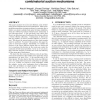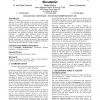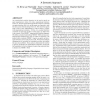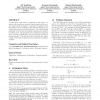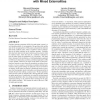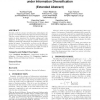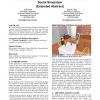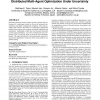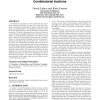ATAL
2010
Springer
14 years 22 days ago
2010
Springer
This paper analyzes the worst-case efficiency ratio of falsename-proof combinatorial auction mechanisms. False-nameproofness generalizes strategy-proofness by assuming that a bidd...
ATAL
2010
Springer
14 years 22 days ago
2010
Springer
Agents in a multi-agent system do not act in a vacuum. The outcome of their efforts depends on the environment in which they seek to act, and in particular on the efforts of other...
ATAL
2010
Springer
14 years 22 days ago
2010
Springer
ATAL
2010
Springer
14 years 22 days ago
2010
Springer
An organizational modeling language can be used to specify an agent organization in terms of its roles, organizational structure, norms, etc. Such an organizational specification ...
ATAL
2010
Springer
14 years 22 days ago
2010
Springer
A multi-agent VRP solver is presented in this paper. It utilizes the contract-net protocol based allocation and several improvement strategies. It provides the solution with the q...
ATAL
2010
Springer
14 years 22 days ago
2010
Springer
Coalition structure generation (CSG) for multi-agent systems is a well-studied problem. A vast majority of the previous work and the state-of-the-art approaches to CSG assume a ch...
ATAL
2010
Springer
14 years 22 days ago
2010
Springer
ATAL
2010
Springer
14 years 22 days ago
2010
Springer
ATAL
2010
Springer
14 years 22 days ago
2010
Springer
Increasing teamwork between agents typically increases the performance of a multi-agent system, at the cost of increased communication and higher computational complexity. This wo...
ATAL
2010
Springer
14 years 22 days ago
2010
Springer
Combinatorial auctions have been studied by the multiagent systems community for some time, since these auctions are an effective mechanism for resource allocation when agents are...
